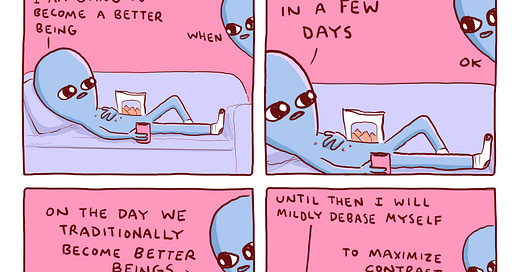
Discover more from Thoughts for Men
First off - a huge thanks to the 20-odd of you who have (willingly) subscribed to this crazy thing. Most of you I know, but some I don’t; thanks for your support. Please spread the word, if you’re enjoying it, and let’s see how far we can get in 2024.
Ah, the new year! Crisp snow (or pouring rain, here in Scotland). New beginnings on New Year’s Day (or, for most Scots, nursing the massive hangover from Hogmanay the night before).
And of course, resolutions.
New Year’s resolutions are oft-pilloried, and rightly so. We all know the stupidly-high rate of gymgoers who appear in January, become sparse in February, and are ne’er seen again.
I’m not here to argue for or against New Year’s Resolutions. I’ll certainly make some, and I’ve got some tips in the Action Points section at the end of the newsletter.
What I want to argue for, hopefully convincingly, is the discipline of resolving.
Making Resolutions
We tend to talk about the end first - “resolutions.”
But resolutions don’t come out of thin air. We make resolutions when we resolve to do something; the will comes first, then the goals.
There’s a fun example of this in the Netflix series Castlevania. Sypha, a magician, prepares to cast a spell through a magic mirror.
“I have to be able to see it to put my intent on it.”
“Your intent?”
“That’s all magic is, Alucard. Changing things in accordance with my intent.”
Entertaining fiction, but also a bit of truth. When we truly resolve to do something, we’re doing more than just setting goals. We’re actually setting out to fundamentally alter reality in our favour.
The new year may be one of the few times that we think of life in those terms; will, intent, resolution. Those are all words that speak to the individual, but also to the undefinable. My strength can be measured - 4 reps of 80 kg on the bench press - but my will can’t.
So instead, we express our will through certain achievements.
Resolving
The will is tricky. I’d argue we’re quite comfortable with casual efforts of will, but truly significant achievements require much more. So sure, I desire to be fitter or stronger - but do I have the will to go to strength and conditioning sessions for boxing class? Or to add cardio on the off days?
Do I have the will to steadily work at developing better habits? At cutting out bad ones? At examining myself?
The will both reflects our inner man and shapes it. When we make resolutions, we seek to apply our will to external forces. But we’re also - usually - taking cues from external forces. That’s probably most clear with New Year’s resolutions; I’ve put on weight over the holidays, now it’s time to work that off - boom, resolution to hit the gym 5x per week.
The problem with most of those is that as the external cues shift, so our will to make certain changes waxes and wanes. Drop a couple pounds naturally after the holidays, and the will to keep at it in the gym drops accordingly.
So what separates a true “act of will” from a mere resolution?
Internal focus
This is a Christian newsletter, not a New Age attempt at spirituality, so I’ll spare everyone the “sharpen your mind’s eye” routine.
Instead, I’ll note that the Bible is replete with examples of men who did resolve to achieve certain things, and who therefore did. Those examples range from men who resolved not to do certain things (David, refusing repeatedly to attack Saul despite provocation) to men who displayed extraordinary discipline in order to achieve certain goals.
Perhaps the best example is Daniel. He resolved to set himself apart, by diet and lifestyle. His resulting discipline led him to second-in-command of multiple empires.
In both of those examples, the Scriptural focus is on both men’s ultimate source of strength - God, and their faith in Him. But there’s clearly an element of self-will in those stories. Faced with unusual circumstances, both Daniel and David resolved to act in certain ways.
Crucially, note that both examples were rewarded. Greatly.
Developing habits of resolve
Back to the “real world.”
If you’re considering making a set of New Year’s resolutions, consider focusing more on the will - the resolve - than on the resolution itself. I think the key here is to be selective; no-one has an infinite amount of self-will or resolve. Everyone has to marshal their resources carefully.
Resolve to do everything, and you’ll likely do nothing. Resolve to accomplish one or two specific goals, and you’re far more likely to succeed. And as an added benefit, you’ll begin to develop a habit of setting your will on something, and then achieving it.
Go work some magic in 2024.
Action Points
Set monthly resolutions. An older friend of mine introduced me to this idea years ago, and it was a game-changer. Don’t make grand resolutions for the entire year - one mistake in January, and you’ve screwed the whole thing up 11 months early. At that point, any motivation vanishes, and you’re back to square one.
Instead, resolve monthly. Lose 2 pounds in January. Read 1 book. Walk 1 mile every couple of days.
Whatever it is, start small - or big! - but give yourself regular chances to evaluate your progress, celebrate wins, and recalibrate if some resolutions are just not doable.
Subscribe to Thoughts for Men
Life thoughts. For men. From a man. From the frontlines, reflections on striving to be an extraordinary man in an extraordinary world. You'll also find occasional tips on writing (it's what I do), plus whatever else I feel like talking about.







